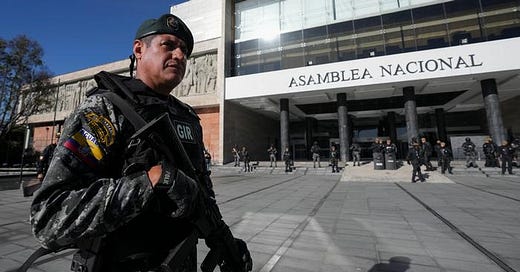Ecuador’s Constitutional Court unanimously rejected challenges to President Guillermo Lasso’s dissolution of the National Assembly, yesterday. Members of opposition parties and social organizations had presented six separate cases to the court arguing that Lasso’s move to call early elections and rule by decree until a new government takes office was illegal on the grounds that Ecuador is not facing any urgent crisis.
But the court said it does not have jurisdiction to “rule on the verification and motivation of the cause of serious political crisis and internal upheaval invoked” by Lasso to dissolve the assembly. (Reuters, Associated Press, see yesterday’s post.)
Minutes after the Constitutional Court ruling, the electoral authority launched an electoral period, with voting for general elections tentatively scheduled for Aug. 20, with a run-off, if needed, on Oct. 15. (El Comercio)
Ecuador has been relatively calm since Lasso’s move earlier this week, despite the threats of protests from Indigenous groups and social organizations. Police permitted National Assembly employees to enter the building yesterday to retrieve their belongings, and former lawmakers are expected to be allowed to do the same on Monday. (EFE)
Meanwhile, Lasso has prepared a series of economic measures, to be enacted by decree, which could include labor reform and the creation of free trade zones, in addition to a tax reform he already announced earlier this week. (El Comercio)
Haiti
Haitian vigilante groups, “Bwa Kale,” are fighting back against gangs that have terrorized civilians for years, in the absence of official responses. But rights advocates warn that their actions risk worsening violence in the country, and that the vigilantes could be targeting people who aren’t gang members — either in cases of mistaken identity or to settle unrelated scores, reports the Washington Post.
Colombia
A bombing by illegal miners at the Chinese-owned Buriticá gold mine in Colombia killed two people and injured 14 more. The attack occurred in Antioquia province, where road blocks and attacks by illegal miners are frequent, reports Reuters.
Testimony given by Salvatore Mancuso, of the primary leaders of Colombia’s paramilitary forces in the country in the late ’90s and early 2000s, before the Special Jurisdiction for Peace tribunal gave grim evidence regarding paramilitary assassination programs during the country’s long internal conflict, reports Al Jazeera.
A Colombian government tally of the nation’s oil reserves is expected to show a decline, a potential challenge to President Gustavo Petro’s ban on new fossil-fuel contracts. (Bloomberg)
There are mixed reports over the survival of four Indigenous children lost in the Colombian Amazon after a plane crash — New York Times
Colombian Vice President Francia Márquez’s trip to South Africa, Kenya and Ethiopia this month provided “a unique opportunity for African countries to assert their individual and collective interests through enhanced international cooperation,” writes Fabien Anthony of the Pan-African Council in CNBC.
El Salvador
More than 5,000 soldiers and 500 police officers surrounded the El Salvadoran city of Nueva Concepción on Wednesday, a show of force after a police officer was killed by an alleged gang member. (Al Jazeera)
El Salvador’s President Nayib Bukele leverages “dozens of YouTube channels distributing daily content that acts as echo chambers not only in El Salvador but internationally,” reports El Faro English. “The videos create an apparently organic narrative that deeply influences the political conversation in El Salvador and about El Salvador.”
“There is substantive evidence that Bukele and Bukelism are constructing a political project based on populism and authoritarian practices … this form of digital authoritarianism not only restricts online and offline freedom of expression in El Salvador but also reflects the dynamics of digital repression and surveillance inspired by other authoritarian regimes around the world,” according to The Unfreedom Monitor, a Global Voices Advox research initiative.
Guatemala
A coalition of press freedom groups is expressing concern about what they called the “historic” threats facing Guatemalan journalists in the face of government prosecutions, reports the Associated Press. (See Tuesday’s post.)
Guatemala’s upcoming presidential election takes place in a context of mass protests against taxation measures and the forced displacement of Indigenous communities, reports Nacla.
Regional Relations
Brazilian President Luiz Inácio Lula da Silva’s stance on Ukraine “reveals broader misgivings across the global south about the inclusiveness of the supposedly liberal international order,” writes Oliver Stuenkel in Foreign Policy.
Brazil
Brazil’s environmental regulator refused to grant a license for a controversial offshore oil drilling project near the mouth of the Amazon River. The decision prompted celebration from environmentalists who had warned of its potential impact, reports the Associated Press.
Brazil burned fossil fuels for electricity at the lowest level in more than a decade in February, thanks to booming use of wind and solar power, according to a new study by British clean-energy research group Ember. (AFP)
Lula’s environmental promises are politically complicated to keep, according to World Politics Review.
Brazil’s lower chamber of Congress voted to fast-track consideration of the government’s new fiscal framework proposal putting it on an accelerated path to its potential approval, reports Bloomberg.
Cuba
Russian and Cuban officials and business leaders announced new perks to entice Russian investors into the Cuban market. It is the latest sign of fast-growing economic ties between the two long-time political allies, according to Reuters.
Mexico
A busload of about 50 migrants were kidnapped by a gang in northern Mexico earlier this week. It is the latest of a series of mass abductions, reports the Associated Press.
Regional
The supply chain from Chinese companies and criminal organizations to the Mexican Sinaloa Cartel is drawing increasing attention from the U.S. government after years of investigation by law enforcement, reports the Guardian.
Gen. Gary Prado Salmón, who as a Bolivian Army captain led the operation that captured the Argentine revolutionary Che Guevara, in 1967, died earlier this month. (New York Times)
Venezuela
A U.S. federal judge dismissed criminal charges against a Swiss banker accused of helping stash millions in bribes paid to senior Venezuelan oil officials, reports the Associated Press.
Culture





